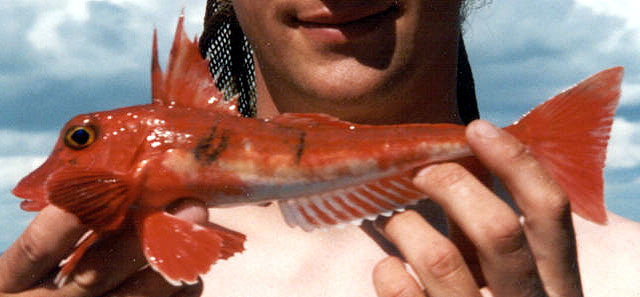| Triglidae (Searobins), subfamily: Triglinae |
| 70 cm TL (male/unsexed); max. reported age: 21 years |
|
demersal; marine; depth range 15 - 400 m |
| Eastern Atlantic: British Isles (occasionally Norway) to Mauritania (including Madeira and Azores); throughout the Mediterranean (Ref. 3687); and Black Sea (Ref. 57855, 58342). |
|
Dorsal spines (total): 9-10; Dorsal soft rays (total): 17-18; Anal soft rays: 16-18. Head large, without deep occipital groove. First dorsal spine serrate anteriorly, second spine not elongate. Lateral line scales plate-like expanded vertically. Breast and anterior part of belly without scales. Vertebrae 36-37 (13-14 precaudal and 22-23 caudal). Pectoral fin with last 3 rays free. Snout steep, prolonged forward by a denticulated and bilobed flattened rostrum. |
| Occasionally forms schools. Found over sand and gravel, crag, and rocks in the continental shelf (Ref. 2723). Feeds on benthic crustaceans, other invertebrates and bottom-dwelling fishes (Ref.4697). |
|
Least Concern (LC); Date assessed: 20 May 2013 Ref. (130435)
|
| harmless |
|
Fairly common in the trawl. |
Source and more info: www.fishbase.org. For personal, classroom, and other internal use only. Not for publication.

